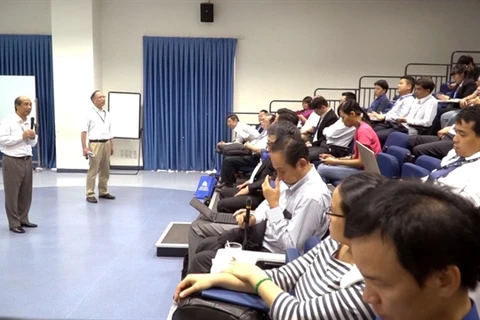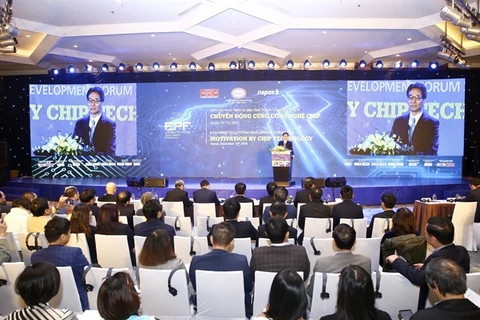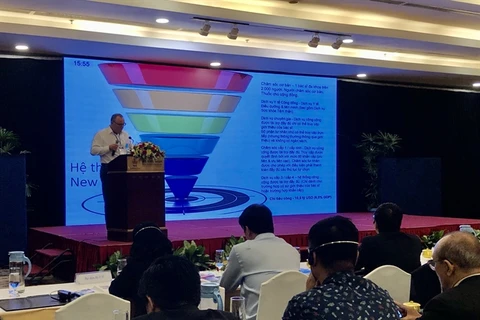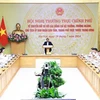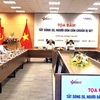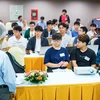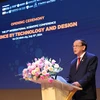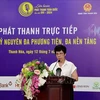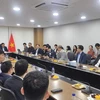Hanoi (VNA) – Vietnam has focused on the development of artificial intelligence (AI) – a spearhead projected to become the most breakthrough technology in the next 10 years.
AI is among the technologies that receive attention at present and the representatives of the Fourth Industrial Revolution (Industry 4.0).
In the context of development and international integration, along with the fast growth of Industry 4.0, Vietnam has been focusing on the development of artificial intelligence (AI) – a spearhead projected to become the most breakthrough technology in the next 10 years.
Initial products
Even though AI just made appearance in Vietnam in recent years, especially after the country became aware of Industry 4.0, local companies have quickly caught up with the AI trend with their products.
Despite difficulties in both fundraising and human resources, strong investment by Vietnamese firms manifests their passion for AI development to affirm the position of Vietnam in the world’s technology sector.
In Vietnam, AI has been used in apps like facial recognition camera, virtual assistants in smart phone, self-driving vehicles, nano robot developed by FPT, Zalo Brain and Zalo Assistant of VNG, among others.
Of note, AI is a new wave which promises complete change for businesses engaging in the field as well as the country’s economy. Vietnam’s tech firms now all go for AI research, development and application for their products.
One of the prominent achievements of engineers and scientists of Zalo AI in the year was Ki-ki virtual assistant. What distinguishes Ki-ki from other AI products developed by world’s tech firms is its ability to recognise Vietnamese people’s voice and respond in dialects of the country’s three regions naturally.
Viettel is also among the Vietnamese firms investing in AI. The telecommunication company recently set up a cyberspace centre (VTCC), with AI being a focus in its research. VTCC.AI is working on speech recognition and language processing in Vietnamese.
A number of apps with AI developed by Vietnamese were highly regarded in the international market. ELSA was a product of Vietnamese start-ups which received great attention in the last three years. The app, voted as among the top five AI apps globally, was to help users practice English pronunciation developed by Van Dinh Hong Vu.
Other aspects of life such as traffic, education and health care could enjoy improvements with AI.
No minor challenge
Although AI is an inevitable trend and boasts huge potential, Vietnam is facing many challenges to develop this field, according to Deputy Minister of Science and Technology Bui The Duy.
Compared to countries with leading AI technology like Japan and European nations, Vietnam is far behind while research groups in information technology have yet to team up to create an AI core product. Many AI communities have been formed, mostly by the private sector.
Duy stressed that AI development could succeed only with the combination of human power and data, therefore domestic businesses need to carry out data-sharing for joint development.
Vietnam must devise a suitable national AI development strategy which identifies the size of the country’s AI market and build policies to create driving forces for the market.
Breakthrough technological sector
At the AI4VN in September, Minister of Planning and Investment Nguyen Chi Dung noted that the AI sector reported a growth of more than 70 percent in 2018 compared to the previous year, equivalent to 200 billion USD.
AI is likely to become an outstanding breakthrough technology 10 years later.
He added that to bolster the sector’s development, the Government has assigned the Ministry of Planning and Investment to build a national strategy on Industry 4.0. The draft strategy is being completed and AI is one of the priorities.
Human resources development will be a top priority, particularly training quality improvement for tertiary education, establishment of training centres on Industry 4.0, incentives for technology application and innovation of businesses and investment and research via funds and innovation centres.
The ministry has launched various activities to support AI start-ups and companies and sought funding from international and domestic sources./.


